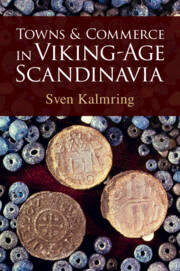Book contents
- Towns and Commerce in Viking-Age Scandinavia
- Additional material
- Towns and Commerce in Viking-Age Scandinavia
- Copyright page
- Epigraph
- Contents
- Plates
- Figures
- Maps
- Acknowledgements
- Abbreviations
- Maps
- 1 Introduction
- 2 The Viking-Age Town
- 3 The Viking World
- 4 Cult, Jurisdiction and Markets
- 5 Local Society and Viking-Age Towns
- 6 An Urbanisation Based on Harbours
- 7 Jurisdiction and Taxes
- 8 Free Trade within Narrow Boundaries
- 9 Special Economic Zones of Their Time
- 10 Development after the Inception Phase
- 11 Discussion: Hedeby’s Abandonment and the Foundation of Slesvig
- 12 Summary and Conclusions
- References
- Index
- Plate Section
9 - Special Economic Zones of Their Time
Published online by Cambridge University Press: 04 January 2024
- Towns and Commerce in Viking-Age Scandinavia
- Additional material
- Towns and Commerce in Viking-Age Scandinavia
- Copyright page
- Epigraph
- Contents
- Plates
- Figures
- Maps
- Acknowledgements
- Abbreviations
- Maps
- 1 Introduction
- 2 The Viking-Age Town
- 3 The Viking World
- 4 Cult, Jurisdiction and Markets
- 5 Local Society and Viking-Age Towns
- 6 An Urbanisation Based on Harbours
- 7 Jurisdiction and Taxes
- 8 Free Trade within Narrow Boundaries
- 9 Special Economic Zones of Their Time
- 10 Development after the Inception Phase
- 11 Discussion: Hedeby’s Abandonment and the Foundation of Slesvig
- 12 Summary and Conclusions
- References
- Index
- Plate Section
Summary
The previous chapters have outlined the special topographical locations and distinct characteristics of the Viking-age towns, which were sharply contrasted with the main features of the surrounding rural Viking-age society. The case was made for a deliberate separation of the towns from the surrounding local societies not only geographically by their strategic locations in no man’s land but also legally through their own things and a separate jurisdiction and finally by the exclusive, restricted and controlled alien presence at these sites. Since these few Viking-age towns, actively developed and promoted by their respective rulers, were thus clearly the exception to the rule defined by the surrounding social structures, it was certainly not the result of, as Randsborg (1989: 191) suggested, ‘the economic and social development [that] led e.g. to the growth of market towns on the coasts’, reversing cause and effect in his conclusion. On the contrary, as will be demonstrated in what follows, their establishment took place against a background of economic backwardness and tenacious social development as instruments to accelerate local economic development. In other words, the towns became political, administrative and economic tools for a controlled influx of funds and innovations from abroad.
- Type
- Chapter
- Information
- Towns and Commerce in Viking-Age Scandinavia , pp. 123 - 146Publisher: Cambridge University PressPrint publication year: 2024

